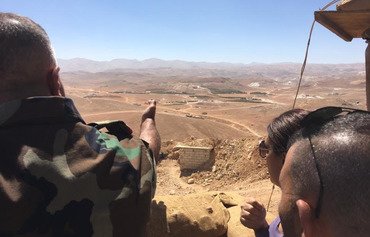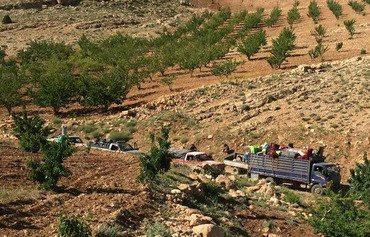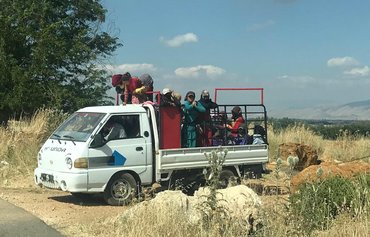Lebanese farmers from towns along the Syrian border tell Al-Shorfa they are facing economic hardship as the presence of extremist groups has prevented them from accessing their land and exporting crops they are able to produce.
Farmers from the Bekaa Valley towns of al-Qaa, Arsal and Ras Baalbek say agricultural production is near its lowest level due to the actions of the "Islamic State of Iraq and the Levant" (ISIL), al-Nusra Front (ANF) and Hizbullah.
In al-Qaa, one of the country's most fertile and productive areas, agricultural projects encompass about 180,000 dunams, said agronomist Elie Shdeed, who oversees one of the area's largest agricultural projects.
"The fear and anxiety that prevail in the region due to the ongoing events in Syria and the proliferation of ISIL and ANF at al-Qaa’s borders and the terrorist attacks they carry out have led to a decline in agricultural production and investment and stopped exports to Gulf countries," he told Al-Shorfa.
Agricultural projects in al-Qaa are among the largest in Lebanon and have traditionally attracted labourers from Syria, he said, adding that the area now accommodated up to 30,000 refugees, most of whom work in agriculture.
Though there is no shortage of labour, "production in the area has declined because of the terrorism that has infiltrated into al-Qaa and its environs and at the border with Syria", Shdeed said.
Residents are concerned about the infiltration of armed extremist groups into the region from neighbouring Syria, he said, especially in the wake of the recent suicide bombings in al-Qaa.
On Wednesday (July 13th), the Lebanese army fired heavy artillery at the posts of extremist groups in the outskirts of Arsal, Lebanese media reported.
The army also targeted militant posts on the outskirts of Ras Baalbek and al-Qaa, with the bombardment intensifying in the afternoon.
Overland exports blocked
Farmers are facing a major crisis with regard to exports, Shdeed said.
"We used to export 70% of our production to Arab and Gulf states, but overland exports stopped when ISIL and ANF seized control of land borders and we are unable to export by sea or air because the cost is prohibitively high," he said.
"All these factors have caused us to incur heavy financial losses that accumulate year after year, and have stopped new agricultural investments," he added, noting that production in his own vineyards and orchards, which grow peaches, apricots, plums and apples, has been severely impacted by ISIL's terrorism.
In nearby Arsal, roughly 70% of the residents are farmers, with agricultural lands encompassing about 460 square kilometres, local farmer Mahmoud al-Fleiti told Al-Shorfa.
"Today, we are living through dark days, as residents used to depend on the production of 8,000 tonnes of cherries and apricots [generating] 15 billion Lebanese pounds ($10 million) in annual revenue," he said.
"We have vast fertile agricultural lands scattered in the valleys, mountain passes, slopes and outlying areas at varying elevations that receive varying amounts of rainwater," he said, noting that they produce the finest fruits.
Access to land cut off
Since the onset of Syria's war, the proliferation of ISIL and ANF in the outlying areas, and Hizbullah’s intervention in Syria, "no farmer has been able to access his land, and the same is true for quarry owners and workers", al-Fleiti said.
Because of this, he said, farmers and other business entities in the northern Bekaa Valley are "going through difficult and stifling economic circumstances".
"Our savings from previous seasons have been depleted and it is impossible for us to access our lands in the outlying areas as they are under the control of ISIL and ANF," he said.
Some time ago, al-Fleiti said, ISIL and ANF issued a circular stating that farmers would be permitted to harvest the cherry and apricot crops, "provided they obtain written permission from the emirs of the two groups".
The farmers rejected this arrangement, he said.
"I have not been to the high outlying areas to tend to my land in three years, and now work only on my land in the northern region near an army checkpoint, as do my fellow farmers," he added.
Growing economic hardship
Al-Fleti said he and a number of other Arsal farmers survive on what their lands in the northern area produce.
"We sell tomatoes and cucumbers to shops in Byblos and Tripoli, but the proceeds do not solve our economic and financial hardships, because our work is disrupted by the clashes between the extremist groups," he said.
"The harvest season used to be a picnic and an outlet for families, but has now turned into a death trip," he added. "The terrorism of ISIL and other groups at our border and on our land has cut off our livelihoods and ruined our lives."
In the border town of Ras Baalbek, farmer Naji Nasrallah told Al-Shorfa that ISIL and ANF control "vast promising agricultural areas in the town’s outlying areas".
"Right after we started investing in them, including a 400-dunam project, all projects came to a halt after a fierce battle took place between militants and the army and the area was turned into a military zone," he said.
Ras Baalbek farmers are currently unable to access 150 square kilometres of agricultural land, Nasrallah said.
"We incurred enormous losses in that area, and we replaced it with safer areas," he said. "While our agricultural losses multiply because of the terrorism perched on our border and some of our lands, our agricultural areas are shrinking, and all this has had a negative impact on our economic situation."

![Grapes await harvesting at a vineyard in al-Qaa in the northern Bekaa Valley. Area farmers say violence near the Syrian border has severely affected their agricultural production and revenue. [Photo courtesy of Elie Shdeed]](/cnmi_am/images/2016/07/13/5828-Lebanon-vineyard-alqaa-600_384.jpg)






